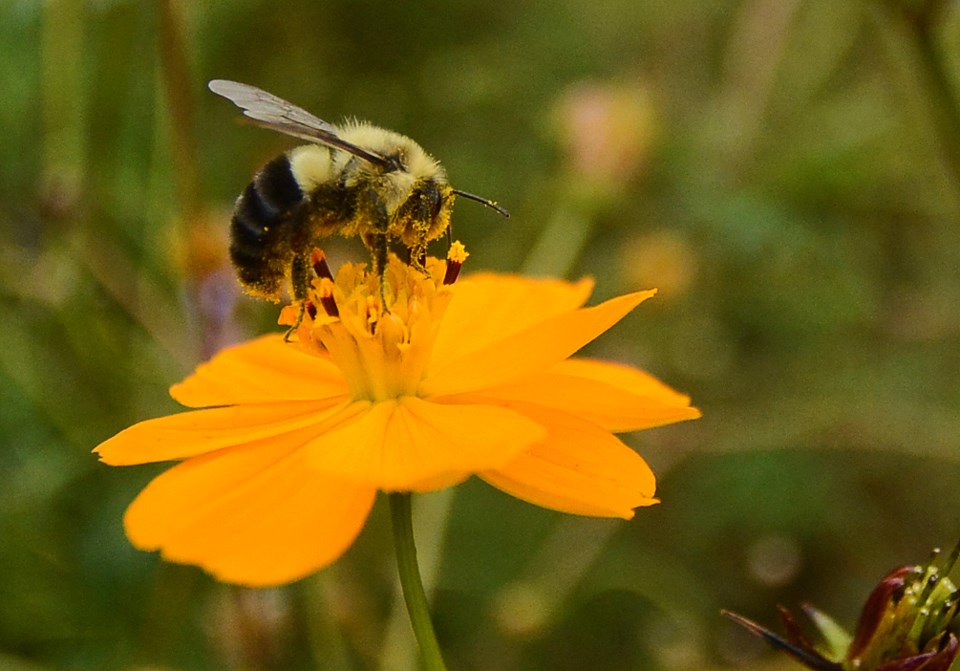A local environmental group is the recipient of an Ontario Conservation Award, demonstrating the impact of grassroots leadership in protecting nature both now and in the future.
Pollination Guelph was honoured with the J.R Dymond Public Service Award last week for its work on conservation and building pollinator habitats for insects throughout the city.
“It came as a complete surprise, but it was a very happy surprise,” said Victoria MacPhail, co-chair of Pollination Guelph. The organization was nominated by Nature Guelph, and was one of 40 nominees from across the province to receive one of 10 awards.
Pollination Guelph is an entirely volunteer-run group that focuses on protecting bee and other insect habitats by building and maintaining public and private gardens across the city to attract various insect species and improve biodiversity. Founded in 2008, it runs educational initiatives and advocacy campaigns, including an annual Pollination Symposium, to help Guelph become a model for the protection of pollinators and a leader in environmental sustainability.
“We are increasingly losing habitat for pollinators, so this is a way of creating a refuge for them and creating stepping stones for them to from one natural area to the next,” said MacPhail, citing expansive development and loss of green space in Guelph – an environmental issue with serious consequences for biodiversity and species protection.
“North America has more acres of lawn than any other type of crop … but that does nothing for wildlife. By creating even little gardens, [we can] increase the number of species in your yard, city, province and country,” said MacPhail, a Prince Edward Island-native who completed her Masters at the University of Guelph before pursuing a PhD in environmental studies at York University on bumble bee extinction in Canada.
Pollination Guelph has established and maintains eight pollinator habitat sites in the city including the Eastview Pollinator Park, Riverside Park and along the TransCanada Trail. In collaboration with Hospice Wellington volunteers, the group also plants a number of community and residential gardens with shrubs, grasses and flowering perennials that offer nutrients and nesting sites for pollinating insects including bees and butterflies.
This year, Pollination Guelph launched a community grant program to provide funding for individuals and organizations in Guelph and Wellington County working to conserve and build pollination habitat. In June, the group distributed a total of $5000 to nine non-profit organizations including the Guelph Enabling Garden, Trillium Waldorf School and the Downtown Neighbourhood Association Community Garden.
“We’re proud of the impact we’ve been having across Ontario. We're very small yet we’ve become kind of a role model for other groups,” said MacPhail, adding that organizations in Burlington, Hamilton, Ottawa and Toronto have consulted with them to implement similar activities and initiatives.
Throughout the summer, the organization is running garden maintenance events where volunteers can help with things like planting, watering and weeding. MacPhail says that people can also support their work by participating in a community science project called iNaturalist – a website and app that allows users to upload a picture of a plant or pollinator that will be identified by fellow naturalists and experts to prompt discussions and track species.
“All observations in Guelph that are submitted to the site get put into a project where we can track where pollinators are in the city, so we can see which species we are attracting and we can monitor the plantings,” she said.
Looking ahead, MacPhail says the organization will continue its outreach work, while also advocating for better environmental policies to further its mission.
“We can have more of an impact if we have legislation that says you must create pollinator habitat when developing or you must reduce pesticide use … We want to try to make those high-level changes that will impact pollinators across the board,” she said.
To learn more about Pollination Guelph, or to volunteer with the board of directors, visit www.pollinationguelph.ca.



